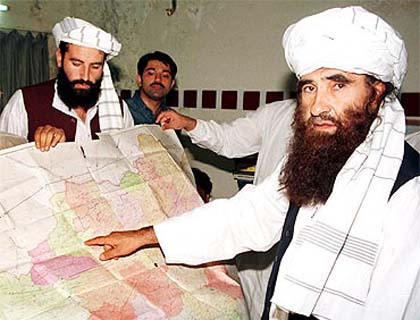PESHAWAR - The Afghan Haqqani militant group will not take part individually in any peace talks with the United States and negotiations must be led by the Taliban, a senior commander told Reuters on Tuesday.
"They (the Americans) would not be able to find a possible solution to the Afghan conflict until and unless they hold talks with the Taliban shura," said the Haqqani group commander, referring to the Taliban leadership council.
Last week, U.S. Secretary of State Hillary Clinton, in Islamabad with a heavyweight team of U.S. military and intelligence leaders, urged Pakistan to persuade the Haqqanis to pursue peace.
She also warned that tough action would have to be taken against Afghan and Pakistani militants if they did not cooperate in efforts to stabilize Afghanistan.
The Haqqani commander, speaking on condition of anonymity, viewed her efforts with skepticism.
"This is not the first time the U.S. has approached us for peace talks. The Americans had made several such attempts for talks which we rejected as we are an integral part of the Taliban led by Mullah Mohammad Omar," he said by telephone from an undisclosed location in Afghanistan.
"We are united and our goal is to liberate our homeland Afghanistan from the clutches of occupying forces."
Clinton said the United States had held preliminary meetings with the Haqqanis -- arguably the most dangerous Afghan insurgent faction -- and was working with Afghanistan and Pakistan to try to put together a peace process.
Taliban leader Omar has been in hiding since the Taliban were forced from power by U.S.-led forces after refusing to hand over al Qaeda leader Osama bin Laden weeks after the Sept. 11, 2001, attacks on the United States.
The Haqqani network is a major source of tension between the United States and Pakistan.
Admiral Mike Mullen said before retiring as chairman of the U.S. Joint Chiefs of Staff last month that a militant group that had attacked U.S. targets in Afghanistan was a "veritable arm" of Pakistani intelligence. Pakistan angrily denied the accusation.
After years of demanding Pakistan crack down on the network, named after veteran Afghan militant commander Jalaluddin Haqqani, the United States wants Pakistan to bring that group and other militants to the peace table.
The battle-hardened Jalaluddin Haqqani is believed to be in poor health and his son, Sirajuddin, is the group's operational leader.
Across Afghanistan, U.S. and NATO forces have been unable to deal a decisive blow to Taliban insurgents and their allies like the Haqqanis, blamed for a series of bloody attacks.
The United States is eager to improve security in the region as much as possible by the end of 2014, when all NATO combat troops are due home from Afghanistan.
More than 2,700 NATO troops have been killed since 2001, as well as more than 11,000 civilians. Many thousands more have been wounded.
"We consider that trying to invite individuals or fighting groups for peace talks other than the Taliban shura would be waste of time," said the Haqqani group commander, referring to Omar and his leadership council.
The Haqqani network, who Washington says are based in Pakistan's North Waziristan region, have emerged as U.S. forces' most high-profile enemy in the region since American special forces killed bin Laden in Pakistan in May.
It is considered close to both al Qaeda and the Pakistani security establishment, though the group says it operates solely in Afghanistan.
The Taliban will keep fighting through Afghanistan's winter season, said the Haqqani commander.
Insurgent attacks have tended to fall off in winter as the mountain passes they use to cross from havens in Pakistan become blocked with snow.
But last year, the winter lull was less pronounced than expected.

